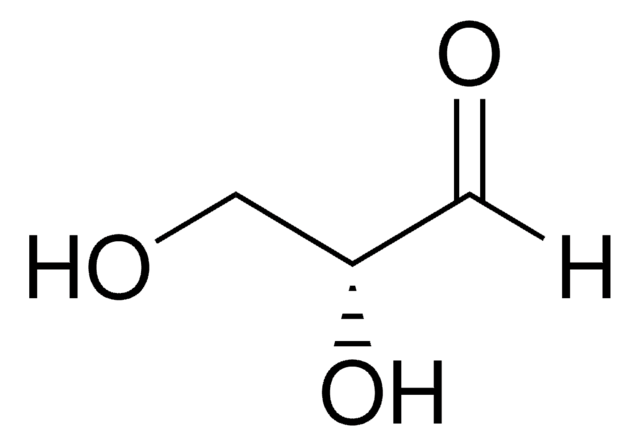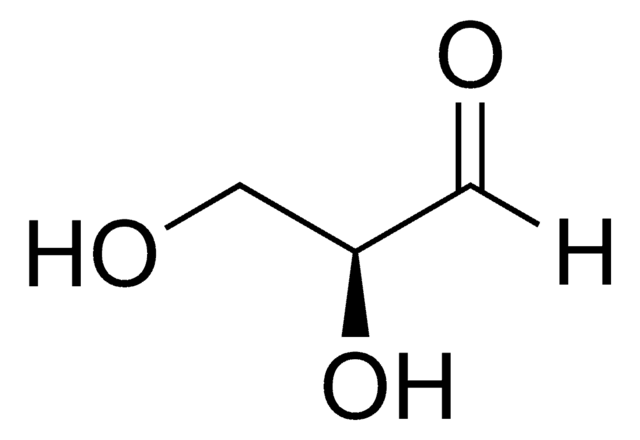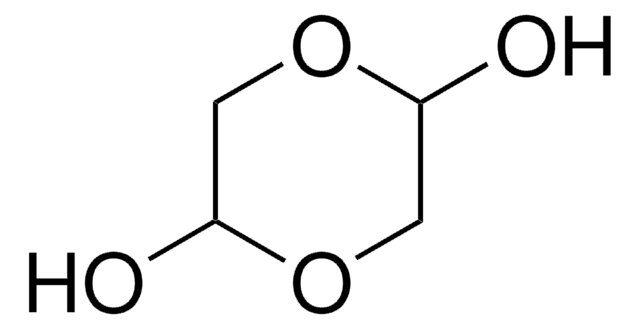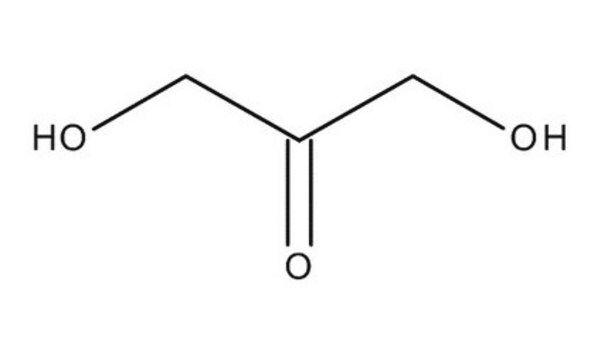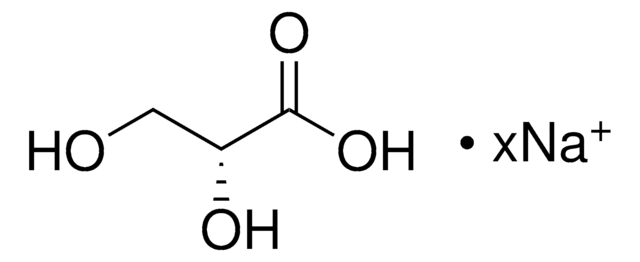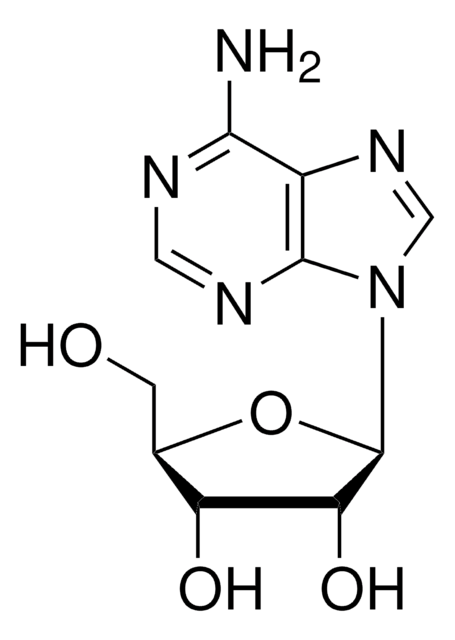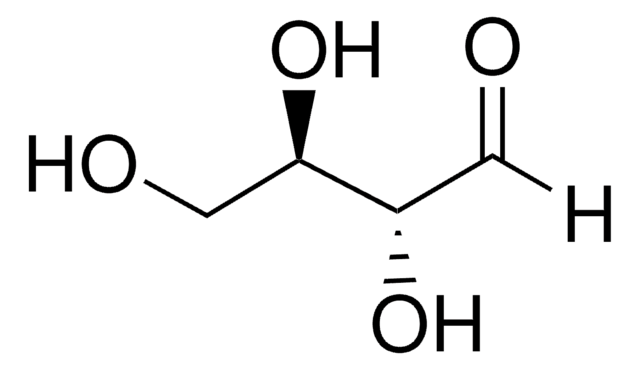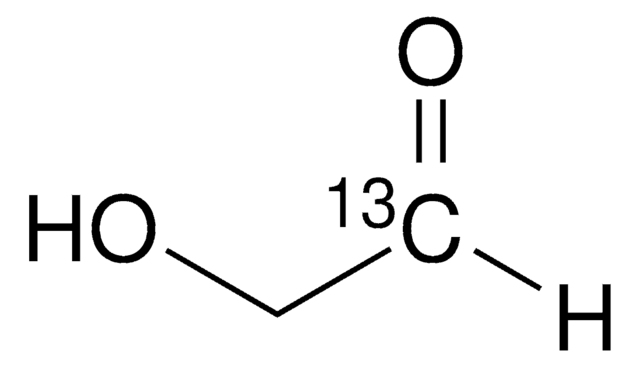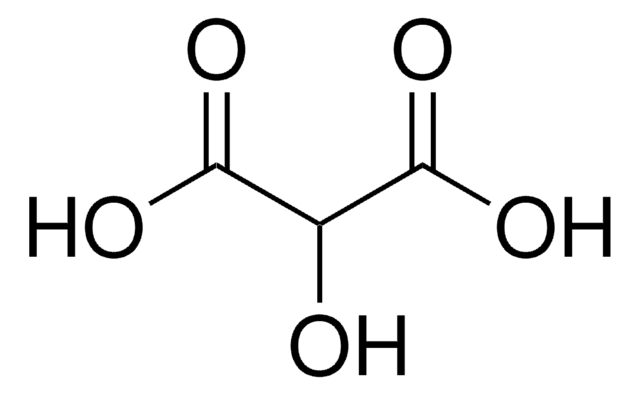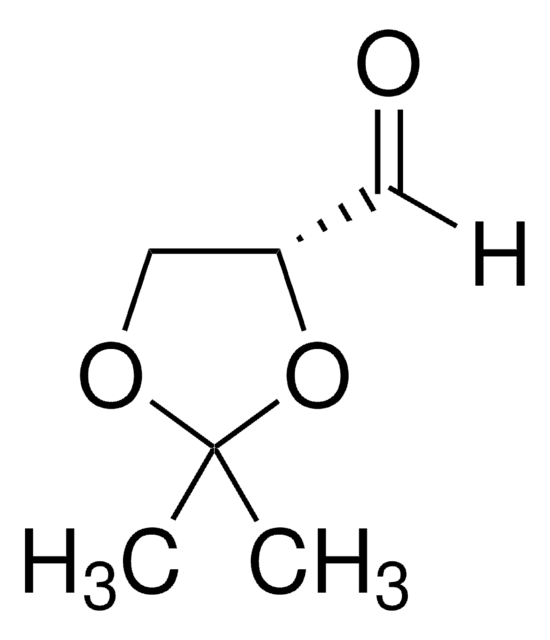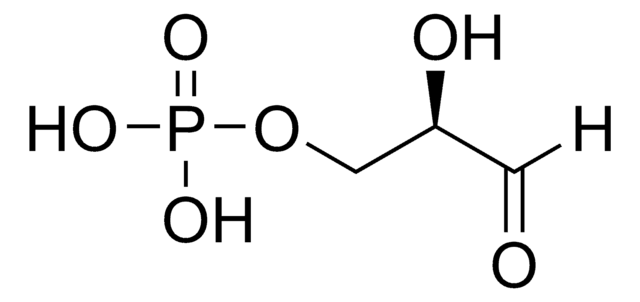G5001
DL-Glyceraldehyde
≥90% (GC)
Sinónimos:
α,β-Dihydroxypropionaldehyde, 2,3-Dihydroxypropanal
Iniciar sesiónpara Ver la Fijación de precios por contrato y de la organización
About This Item
Fórmula empírica (notación de Hill):
C3H6O3
Número de CAS:
Peso molecular:
90.08
Número CE:
Número MDL:
Código UNSPSC:
12352201
ID de la sustancia en PubChem:
NACRES:
NA.25
Productos recomendados
origen biológico
synthetic
Nivel de calidad
Ensayo
≥90% (GC)
Formulario
powder
color
white to off-white
mp
145 °C ((293 °F ))
solubilidad
water: 50 mg/mL, clear to slightly hazy, colorless to faintly yellow
temp. de almacenamiento
room temp
cadena SMILES
[H]C(=O)C(O)CO
InChI
1S/C3H6O3/c4-1-3(6)2-5/h1,3,5-6H,2H2
Clave InChI
MNQZXJOMYWMBOU-UHFFFAOYSA-N
Descripción general
Glyceraldehyde is a simple monosaccharide. Based on the number of carbon atoms and the type of carbonyl group present, glyceraldehyde belongs to subgroup triose. It is a colourless and sweet compound.
Aplicación
DL-Glyceraldehyde has been used:
- as modifying reagent in the preparation of crystallization solution
- as a substrate to measure aldose reductase activity
- in the preparation of d/l-glyceraldehyde stock to determine the specific activity of GAPDH (glyceraldehyde 3-phosphate dehydrogenase)
Acciones bioquímicas o fisiológicas
Glyceraldehyde serves as an efficient cross-linking agent and is considered non-toxic. It is an intermediate of a number of metabolic such as glycolysis and pentose phosphate pathway.
Otras notas
DL-Glyceraldehyde is a substrate for the enzyme aldose reductase.
To gain a comprehensive understanding of our extensive range of Monosaccharides for your research, we encourage you to visit our Carbohydrates Category page.
Código de clase de almacenamiento
11 - Combustible Solids
Clase de riesgo para el agua (WGK)
WGK 3
Punto de inflamabilidad (°F)
Not applicable
Punto de inflamabilidad (°C)
Not applicable
Equipo de protección personal
Eyeshields, Gloves, type N95 (US)
Elija entre una de las versiones más recientes:
¿Ya tiene este producto?
Encuentre la documentación para los productos que ha comprado recientemente en la Biblioteca de documentos.
Los clientes también vieron
Gemma Sangüesa et al.
European journal of nutrition, 58(3), 1283-1297 (2018-03-09)
Sugar-sweetened beverage intake is a risk factor for insulin resistance, dyslipidemia, fatty liver, and steatohepatitis (NASH). Sub-chronic supplementation of liquid fructose, but not glucose, in female rats increases liver and plasma triglycerides without inflammation. We hypothesized that chronic supplementation of
Raman and infrared spectroscopy of carbohydrates: a review
Wiercigroch E, et al.
Spectrochimica Acta. Part A, Molecular and Biomolecular Spectroscopy, 185(5), 317-335 (2017)
Chethan Sampath et al.
Biomedicine & pharmacotherapy = Biomedecine & pharmacotherapie, 84, 502-513 (2016-09-30)
Hyperglycemic stress activates polyol pathway and aldose reductase (AR) key enzyme responsible for generating secondary complications during diabetes. In this study the therapeutic potential of phloretin, epigallocatechin 3-gallate (EGCG) and [6]-gingerol were evaluated for anti-glycating and AR inhibitory activity in
GAPDH and Intermediary Metabolism
GAPDH: Biological Properties and Diversity, 37-59 (2012)
Stabilization of scleral collagen by glycerol aldehyde cross-linking
N.A.Danilov, et al.
Biochimica et Biophysica Acta, 1780(5), 764-772 (2008)
Nuestro equipo de científicos tiene experiencia en todas las áreas de investigación: Ciencias de la vida, Ciencia de los materiales, Síntesis química, Cromatografía, Analítica y muchas otras.
Póngase en contacto con el Servicio técnico